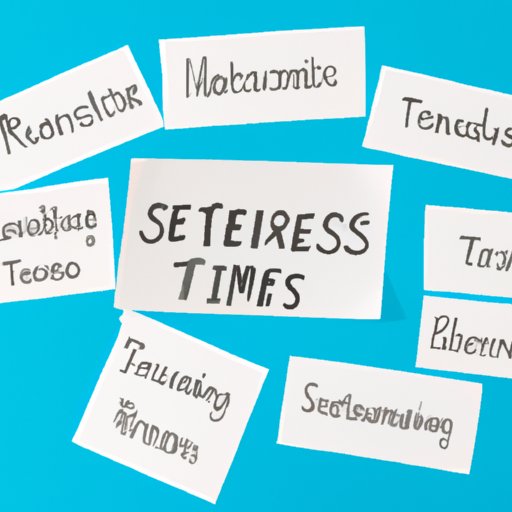Introduction
Stress is an unavoidable part of life. It can be caused by a variety of factors, such as work, family, relationships, and finances. When it becomes unmanageable, however, it can lead to physical and mental health problems. Fortunately, there are many ways to manage stress and stop it from becoming overwhelming.
Overview of Stress
Stress is your body’s reaction to any kind of demand or threat. When you sense danger—whether real or imagined—your body’s defenses kick into high gear in a rapid, automatic process known as the “fight-or-flight” response. This response floods your body with hormones, such as adrenaline and cortisol, which rouse the body for emergency action.
The fight-or-flight response was once lifesaving, enabling people to react quickly to danger. Today, this response can still be helpful in emergencies. However, it can also be triggered by everyday events and situations, such as job interviews, traffic jams, or even arguments.
Introduction to the Problem
When faced with long-term stress, the body’s defense mechanisms remain activated, leading to physical and emotional exhaustion. In addition, research has shown that chronic stress can increase the risk of developing anxiety, depression, heart disease, and other serious health conditions.
The good news is that there are many simple and effective ways to manage stress, such as taking regular breaks, getting regular exercise, practicing mindfulness meditation, and developing healthy coping strategies. Read on to learn more about how to stop being stressed.

Take Breaks Throughout the Day
Taking breaks throughout the day is one of the simplest and most effective ways to reduce stress. Breaks give you a chance to step away from whatever is causing you stress and take a few deep breaths. This can help clear your mind and refocus your energy.
Benefits of Taking Breaks
Studies have shown that taking regular breaks can help reduce stress levels, improve concentration, and boost productivity. According to a study published in the journal Frontiers in Psychology, taking breaks can also help reduce fatigue and improve overall well-being.
Examples of Breaks to Take
There are many different types of breaks that you can take. Some examples include:
- Going for a short walk
- Taking a few minutes to do some stretching or yoga
- Listening to music
- Spending time in nature
- Talking to a friend or family member
- Journaling
- Reading a book
Get Regular Exercise
Exercise is another great way to manage stress. Physical activity releases endorphins, which are hormones that can boost your mood and reduce stress. Exercise can also help you sleep better, which can further reduce stress levels.
Benefits of Exercise
Regular exercise can help reduce stress and improve mental health in many ways. According to a study published in the journal Psychology of Sport and Exercise, exercise can reduce anxiety, improve self-esteem, and help manage depression.
Types of Exercise to Try
There are many different types of exercise that you can try. Some examples include:
- Walking or running
- Weight lifting
- Yoga or Pilates
- Swimming or water aerobics
- Cycling or spinning
- Team sports, such as basketball or soccer
Practice Mindfulness Meditation
Mindfulness meditation is another great way to reduce stress. It involves focusing on the present moment and allowing thoughts and feelings to come and go without judgment. This can help create a sense of peace and calm.
Benefits of Mindfulness Meditation
According to a study published in the journal Psychosomatic Medicine, mindfulness meditation can help reduce stress and improve mental health. Other studies have found that mindfulness meditation can also reduce symptoms of depression and anxiety.
Tips for Practicing Mindfulness Meditation
Here are some tips for practicing mindfulness meditation:
- Find a comfortable place to sit or lie down.
- Close your eyes and focus on your breath.
- Allow your thoughts and feelings to come and go without judgment.
- Notice any sensations in your body.
- If your mind wanders, gently bring it back to the present moment.
Develop Healthy Coping Strategies
Developing healthy coping strategies is another important way to reduce stress. Healthy coping strategies can help you manage difficult emotions and reduce stress levels.
Examples of Healthy Coping Strategies
Some examples of healthy coping strategies include:
- Talking to a friend or family member
- Writing in a journal
- Engaging in creative activities, such as drawing or painting
- Practicing relaxation techniques, such as deep breathing or progressive muscle relaxation
- Doing something enjoyable, such as playing a game or listening to music
Tips for Developing Healthy Coping Strategies
Here are some tips for developing healthy coping strategies:
- Be aware of your triggers. Try to identify what triggers your stress and come up with ways to manage them.
- Set realistic goals. Setting unrealistic goals can lead to additional stress, so make sure to set achievable goals.
- Learn to say no. Don’t take on more than you can handle. Know your limits and don’t be afraid to say no when necessary.
- Take care of yourself. Make sure to get enough rest, eat healthy, and find time to do things that you enjoy.

Make Time for Fun and Relaxation
Making time for fun and relaxation is another great way to reduce stress. Taking time out to do something enjoyable can help you relax and recharge.
Benefits of Making Time for Fun and Relaxation
Making time for fun and relaxation can have many benefits, including reducing stress levels, improving mood, and boosting creativity. Research has also shown that engaging in leisure activities can improve overall quality of life.
Examples of Fun and Relaxing Activities
Some examples of fun and relaxing activities include:
- Going for a walk in nature
- Watching a movie or TV show
- Playing a board game or video game
- Cooking or baking
- Listening to music
- Going to a museum or art gallery
- Spending time with friends or family
Seek Professional Help When Needed
If you find that your stress is unmanageable, it may be time to seek professional help. A mental health professional can help you identify the source of your stress and develop healthy coping strategies.
Signs That You Might Need Professional Help
Some signs that you might need professional help include:
- Difficulty sleeping
- Loss of appetite or overeating
- Feelings of hopelessness or despair
- Thoughts of self-harm or suicide
- Inability to concentrate
- Withdrawal from friends and family
Benefits of Seeking Professional Help
Seeking professional help can have many benefits. A mental health professional can provide support, guidance, and advice to help you manage your stress. They can also help you develop healthy coping strategies and find positive solutions to your problems.
Conclusion
Stress is an unavoidable part of life, but it doesn’t have to be unmanageable. Taking regular breaks, getting regular exercise, practicing mindfulness meditation, and developing healthy coping strategies can all help reduce stress levels. In addition, making time for fun and relaxation, and seeking professional help when needed, can help you manage stress more effectively.
Summary of How to Stop Being Stressed
To recap, here are some tips for managing stress:
- Take breaks throughout the day.
- Get regular exercise.
- Practice mindfulness meditation.
- Develop healthy coping strategies.
- Make time for fun and relaxation.
- Seek professional help when needed.
Takeaway Message
Stress can be difficult to manage, but there are many effective strategies that can help. Taking breaks, exercising, meditating, and developing healthy coping strategies can all help reduce stress levels. Additionally, making time for fun and relaxation, and seeking professional help when needed, can help you manage stress more effectively.
(Note: Is this article not meeting your expectations? Do you have knowledge or insights to share? Unlock new opportunities and expand your reach by joining our authors team. Click Registration to join us and share your expertise with our readers.)
